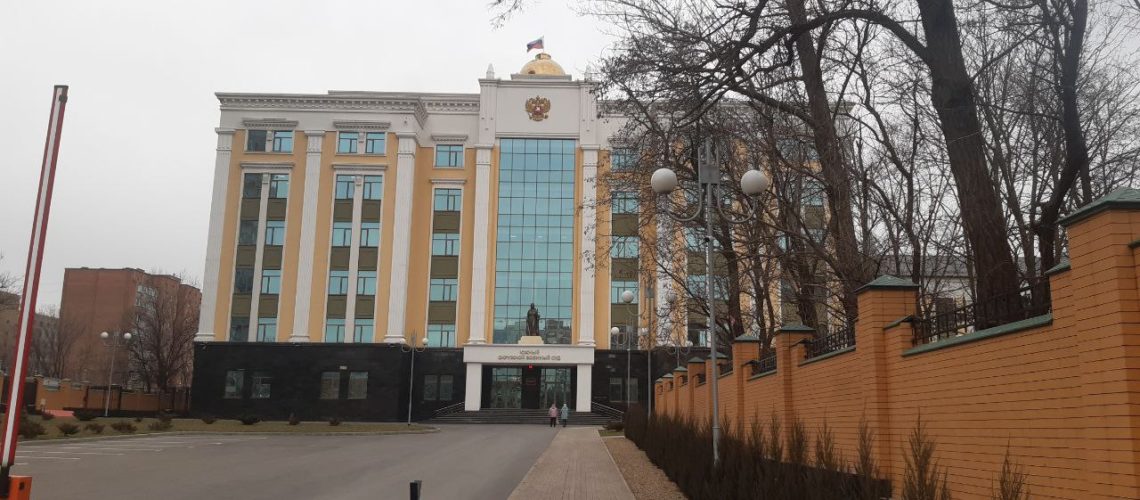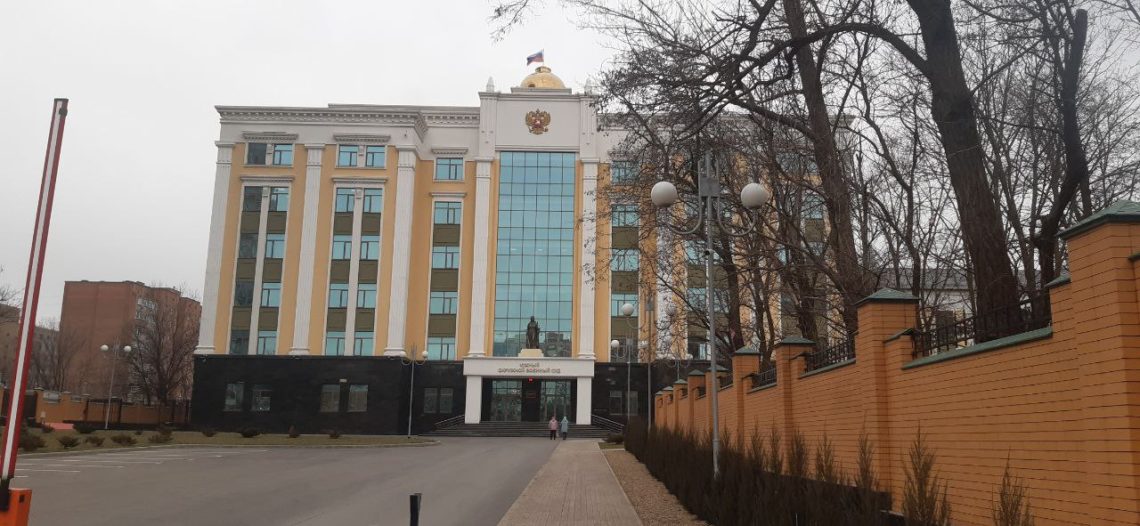

About the case: Five Ukrainian prisoners of war (Ivan Vladimirovich Bezlepkin, Yuri Yuryevich Makarenko, Gleb Alexandrovich Petruk, Vladimir Ivanovich Puzanov, Dmitry Nikolaevich Reyvakh) are accused of participating in terrorist communities (Part 2, Article 205.4 of the Criminal Code of the Russian Federation).
The case is being heard by the Southern District Military Court, Judge Gurgen Serzhikovich Dovlatbekyan.
The court announces the participants in the hearing: the defendants, their defense attorneys, and Prosecutor Kuznetsov.
Before questioning, the presiding judge explains the rights to the defendant Puzanov and asks if he wishes to testify. Puzanov agrees and reads a prepared statement. According to Puzanov, he was mobilized; had he refused, he would have been held liable. On March 19, 2022, he was detained, with documents processed on March 23. He was interrogated without a lawyer, threatened, beaten, and his ribs were broken. He signed something with a bag over his head and did not sign a waiver of counsel. His attorney (Doncova Y.V.) had no questions. The prosecutor asked about his service start date. Puzanov replied that it started in April of 2015. Following his defense attorney’s advice, Puzanov refused to answer further questions.
After his refusal, the prosecutor motioned to read aloud the statements given during the preliminary investigation due to contradictions. The presiding judge asked the prosecutor to clarify the contradictions, to which he replied, “everything.” Attorney Doncova objected to the reading as the statements were obtained without a lawyer. Puzanov also requested the motion be denied. Other defense attorneys objected on the same grounds. The court granted the prosecutor’s motion.
Attorney Arakelyants requested his objections be noted, asserting that reading the statements violated procedural law. The presiding judge immediately responded, that he noted his remarks.
The prosecutor began reading documents regarding Puzanov’s alleged waiver of counsel. Attorney Arakelyants pointed out that the prosecutor was reading unrelated content. The prosecutor only read Puzanov’s statements (initially given without a lawyer, later confirmed with counsel, admitting guilt).
Following the reading, a defense attorney requested the prosecutor be reprimanded for overreach, as he read unrelated material rather than just contradictions. The presiding judge denied the request. Puzanov’s attorney (Doncova) motioned to exclude statements obtained without counsel. Puzanov supported the motion. The prosecutor opposed, stating that Puzanov was informed of his right to counsel but initially waived it and later confirmed his statements with counsel. He then instantly requested the court to investigate documents of the counsel waiver.
Attorney Arakelyants noted that after reading the statements, the prosecutor did not ask Puzanov to confirm them. The court agreed, and Puzanov was asked if he confirmed what was read. Puzanov denied it, saying he signed under duress, adding that anyone would sign anything in such conditions, especially given their lack of food and clothing.
Other defense attorneys objected. One attorney opposed the reading of the refusal protocol, stating that the defense was currently presenting evidence, and the court should deny the prosecutor’s motion.
The prosecutor responded that he requested the refusal be read because Puzanov’s attorney sought to exclude evidence due to the absence of counsel.
The court ruled to read it. The prosecutor read the protocol explaining the right to counsel, the waiver protocol, and the order accepting the waiver.
Attorney Doncova asked that Puzanov be shown the signature on the read documents. The court granted this request.
When asked, “Is this your signature?” Puzanov replied, “No, not even close.” This applied to all waiver documents and the initial interrogation protocol. He hesitantly confirmed one signature on the second protocol (when he had counsel present), stating it was likely the one he made with a bag over his head. He confirmed the signature’s transcription in only one instance and denied others.
The court denied the motion to exclude evidence, stating that these arguments would be considered during deliberation.
Next, Bezlepkin was invited to testify, and he agreed. His attorney (Lakomov S.N.) asked questions. Bezlepkin stated he did not know that the 46th Battalion of the Armed Forces of Ukraine was a terrorist organization. He did not open fire on the Donetsk People’s Republic militia/police and did not engage in terrorist activities. The attorney asked about the protocol ensuring the right to counsel. The presiding judge interrupted, noting it was not examined. The attorney moved to the next question. Bezlepkin explained he signed a contract with the Ukrainian Armed Forces due to lack of work, with a father who is disabled and a retired mother. He detailed his service dates and location. His service ended in late October, and he returned home until April 2022, when he underwent filtration procedures. He reported being detained, bagged, kept at a school, and beaten while restrained.
A question regarding participation in investigative activities was withdrawn by the judge. When asked about a 30-day detention protocol, the prosecutor confirmed its examination on October 4, 2023. Bezlepkin couldn’t recall signing it, so his attorney requested he be allowed to review it. Bezlepkin supported the motion. The prosecutor did not object, and the court granted it. Of the three signatures, Bezlepkin confirmed only one, and even that with hesitation.
Bezlepkin’s attorney requested a videoconference call for a testimony of a special agent who seized Bezlepkin’s passport, as the document is missing from both the case and detention center records. The prosecutor objected, arguing the passport’s absence was irrelevant to the charges. The court denied the request, citing Article 252 of the Code of Criminal Procedure on the trial’s scope.
Bezlepkin’s examination continued. He denied involvement in terrorist organizations, stating he learned of the 46th Battalion’s designation as a terrorist group only from case materials.
The prosecutor motioned to read Bezlepkin’s statements from the preliminary investigation, citing contradictions.
The presiding judge asked the prosecutor, “Don’t you want to ask questions?”
Attorney Arakelyants objected, stating that the court should not be advising the prosecutor.
The prosecutor replied he had no questions but maintained there were contradictions regarding his service dates, locations of military equipment, and unit positions.
Bezlepkin’s attorney opposed, saying the testimony included the necessary chronology and locations. Arakelyants further argued the prosecutor failed to specify the sheets and volumes for reading and no contradictions were established.
Attorney Kluchko A.G. argued that the prosecutor’s contradictions were irrelevant to the charges and the motion violated procedural law.
The prosecutor attempted to clarify contradictions. The presiding judge asked questions to assist the prosecutor in outlining the contradictions.
Attorney Arakelyants objected, arguing that the presiding judge should not be advising the prosecutor.
A judge from the panel intervened, asking the prosecutor why he could not question the defendant on the contradictions.
Arakelyants motioned to recuse the entire court panel, citing the panel’s apparent bias in advising the prosecution. In his motion, Arakelyants used the term “side judge”, and in response, the same judge asked where such a procedural term comes from. Arakelyants apologized, saying he overreacted, but argued that the court is advising instead of adjudicating, as required by law.
All defense attorneys and defendants supported the motion for recusal. The prosecutor opposed, stating there was no basis for recusal.
The court adjourned at 5:42 PM, indicating a ten-minute recess.
The panel returned at 5:56 PM, denying the motion for recusal.
As procedural time expired, the court adjourned the hearing.
© 2019-2021 Independent public portal on impartial trial monitoring
